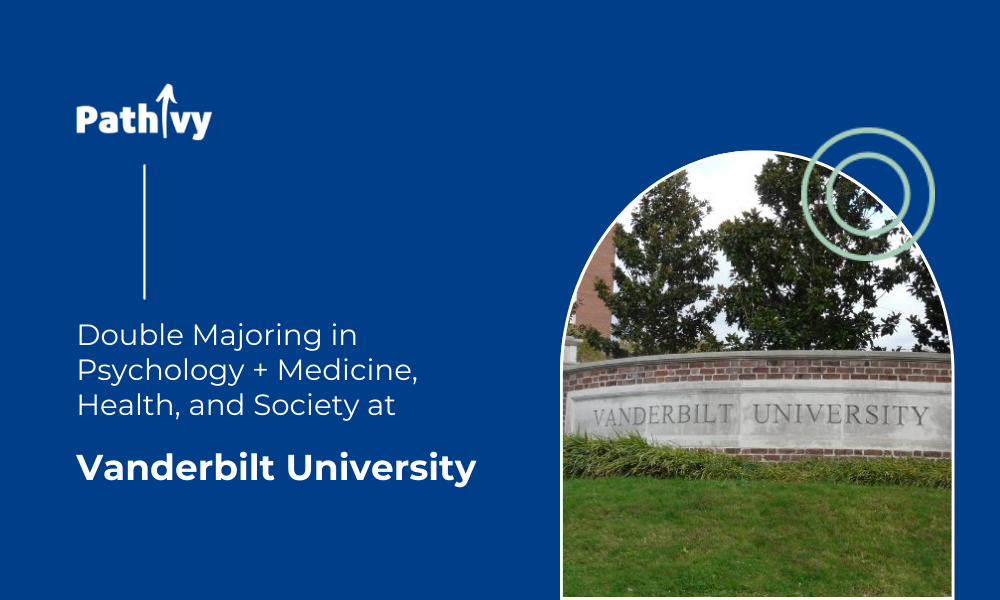Do you ever wonder why people think the way they do? Has the cost of health insurance been a topic of discussion lately at your kitchen table?
These are the type of questions that attracted me to the programs I will be discussing. The connection between mental and physical health is what inspired me to double major in Psychology and MHS at a top 15 university in the nation, Vanderbilt University. Both majors are housed in the College of Arts and Sciences. Students can declare a major as soon as the completion of their second semester, but no later than the fourth semester. Let’s explore what is it like to double major in Psychology and MHS at Vanderbilt University.
Introduction to the Majors
For the Psychology or MHS major, declaring the major is sufficient for joining the program. There are no prerequisite courses needed to declare the major. However, students in each major may follow a sequence of courses to ensure they have a basic level of understanding before enrolling in the upper-level major courses. Also, some upper-level courses may require previous coursework.
Most Psychology majors enroll in PSY 1200 which is General Psychology, the introductory course in the program. From there, to build upon their studies majors may enroll in PSY 2100 and PSY 2150 which are Quantitative Methods and Experimental Design, respectively. PSY 2100 is a course designed to survey the basics of statistics that may be utilized in research or other capacities. PSY 2150 builds upon that by dissecting the process of research and its complexity. There are also, First-Year Writing Seminars (FYWS) in the Psychology Department that can provide exposure to the department and field of study. Majors also have the flexibility of taking courses in Peabody College in the Psychology and Human Development Department. Essentially, Vanderbilt has two psychology majors and therefore allows the students to have access to all the courses. To declare a Psychology major, students visit Angel Gaither, the Program Coordinator in the Psychology Office (Wilson Hall 305). From there, she will provide the major declaration paperwork and assign a major advisor as well.
The Medicine, Health, and Society major is a bit different. Because the major houses many concentrations and it is an interdisciplinary major, the roadmap to completing it is not as uniform or linear. I added the MHS major to my degree plan initially because my pre-med courses counted toward the major. Then, after taking courses in the actual department, I became intrigued with Public Health and am very grateful for this program. To put it plainly, the MHS major can be considered quite broad, and many courses count towards it, depending on your concentration. However, all MHS majors must take a core course out of a list of 8 courses. Luckily, you can also take any of the other courses on the list as an elective or concentration course.
I took MHS 1940: Racial and Ethnic Health Disparities. This course was very informative as to how one’s health can be explained by the factors related to one’s race or ethnicity such as environment, medical racism, and access to resources. This is just one example of the complex topics that are expounded upon in MHS courses. From there, it is up to the student how and when to enroll in courses based on their desired concentration and electives. To declare an MHS major, you can fill out the College of Arts and Sciences Declaration of Major form and email it to Vanderbilt.
Major Statistics and Strengths
Vanderbilt is ranked #14 for the 2022 edition of Best Colleges and National Universities according to U.S News. As a private, research university, many of the faculty continue to make history in their fields. Recently, two Vanderbilt Psychology professors, belonging to one of the three total international research teams, were granted access to the Allen Brain Observatory to conduct experiments to further explore brain function. University HQ, a resource for prospective students, ranked Vanderbilt’s Department of Psychology 11th in the nation in 2020. The MHS department also has its strengths and has been recognized for its contributions and curriculum. It is well known throughout the campus that the MHS department houses the greatest number of undergraduates with declared majors. Current MHS students and alumni were recently announced as 2022-23 Fulbright Scholars.
Psychology Major Requirements
The Psychology Major at Vanderbilt is 36 hours in total. In other words, the major requires 12 classes. To reach this amount of hours/class, here are the requirements:
- PSY 1200, General Psychology (3 hours)
- PSY 2100 or PSY 2110 (Peabody), Quantitative Methods (3 hours)
- PSY 2150, Experimental Design (3 hours)
- 4 Distribution Courses (12 hours) - The department provides a list of 6 courses and requires 4 to be taken to fulfill the distribution course requirements.
- PSY 3100 Abnormal Psychology
- PSY 3120 Cognitive Psychology
- PSY 3110 Social Psychology
- PSY 3750 Perception
- NSC 2201 Neuroscience
- PSY-PC-1250 Developmental Psychology
- 5 Psychology Electives (15 hours)
- Any course in the Department of Psychology or the Department of Psychology and Human Development (Peabody) that is not already being used to meet another Psychology major requirement can be used as an elective. These must be PSY courses.
MHS Major Requirements
The MHS major at Vanderbilt is 36 credit hours of coursework. This is also 12 courses. Due to being a double major, I took advantage of the overlap rule which is allowing up to 12 hours of credit to count towards both majors. Nonetheless, the MHS major requirements are distributed as follows:
Core Course (3 hours)
As mentioned earlier, this course must be taken and chosen from a list provided by the department. The current list is:
- MHS 1920, Politics of Health
- MHS 1930, Social Dimensions of Health and Illness
- MHS 1940, Racial and Ethnic Health Disparities
- MHS 1950, Theories of the Body
- MHS 2110, American Medicine in the World
- MHS 2230, Masculinity and Men’s Health
- MHS 3890 (HUM 1610), COVID and Society
- ANTH 2342, Biology of Inequality
Concentration: Four courses (12 hours)
These courses cannot be used to satisfy core course or elective requirements.
There are 6 Concentrations:
- Global health
- Health policies and economies
- Health behaviors and health sciences
- Inequality, intersectionality, and health justice
- Medicine, humanities, and the arts
- Critical Health Studies
The Arts and Sciences Academic Catalog contains a detailed list of applicable courses for each concentration, including descriptions.
Electives: Seven courses (21 hours)
These may not be used to satisfy concentration or core course requirements. Although, one of the courses can fulfill the disciplinary requirement if it is not already fulfilling a concentration requirement. All MHS and MHS-approved courses may count as electives except for the research seminars (MHS 3830/3831;3880/3881; and 4998/4999) I also found it useful to refer to the catalog to explore other MHS courses to find electives.
For those who have taken STEM courses or plan to, it is important to note that up to 12 hours from this list may be counted as MHS electives for the major: BSCI 1510,1511,2101,2520,3101,3234; CHEM 2221,2222 or 2211, 2212; MHS 1600. The grade in the courses will count towards the MHS GPA.
Disciplinary Requirement: One course (3 hours)
This course also must be chosen from a provided list AND must be used to satisfy the concentration requirement OR electives requirement. The department provides many options here.
My Personal Experience Double Majoring
It may seem overwhelming to plan out your courses, but I promise it is doable. It is even possible to double major as I did. Many of my peers have taken MHS-related courses without even knowing and thus had no trouble declaring the major. The Psychology major is also quite an even-handed major at Vanderbilt compared to others. To put your mind at ease, here is what my junior year schedule looked like:
Fall Semester: 16 credit hours
- Organic Chemistry 1 and Lab
- Spanish for Oral Communication through Cultural Topics
- Health Psychology (PSY or MHS)
- Teaching Assistant for Developmental Psychology (PSY)
- Introduction to Neuroscience (PSY or MHS)
Spring Semester: 16 credit hours
- Human Anatomy and Physiology 2 (MHS)
- Introduction to Sociology (MHS)
- Racial and Ethnic Health Disparities (MHS)
- Principles of Experimental Design (PSY)
To be honest, junior year was my busiest year and I still did not have to enroll in 18 or more hours to fulfill my double major. As you can see, a few of the courses I took could count toward either major or some of them ended up counting for both majors to avoid having to complete the full 36 hours for each of the majors. In the fall semester of my junior year, I was invited to TA a class that I had taken prior, Developmental Psychology. This is an example of a Peabody Psychology course and of an unconventional way of fulfilling your major. I earned course credit for my role as a TA and in turn, this course was considered one of my Psychology electives. I was also able to take pre-med courses and a few Spanish courses while completing my double major as well.
Your Next Steps
Is Vanderbilt your dream school? Do either or both majors seem like the perfect fit for you? Look no further, PathIvy can help you wherever you are on your college admissions journey. Book a free 30-minute consultation with us today to begin your path to your dream school!
Written by Bethsahida Harrigan, PathIvy Vanderbilt University Ambassador
.png?width=175&height=73&name=ORIGINAL%20LOGO%20Blue%20and%20Green%20(1).png)
.png?width=50&name=author-image%20(2).png)

